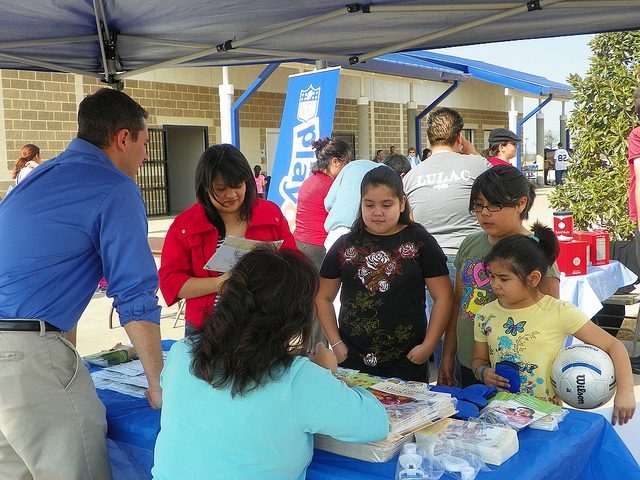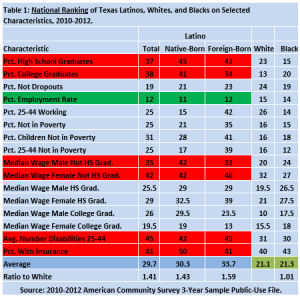Fading American Dream for Texas Latinos

By Juan H. Flores and Dr. Rogelio Saenz, NewsTaco
The American Dream is fading for many Latino families today and for their children tomorrow. This is especially true in Texas where many Latinos face significant barriers to building wealth and future opportunities for their children. As a result, over half (2.3 million) of Latino children are at risk of facing the same disadvantaged position, or worse, than their parents.
Wealth means making a living wage or better, and having assets (home, saving, retirement fund, etc.) that create more choices and resources for one’s children.
[pullquote]The reasons for this grim future for Latino children stems from the continuing lack of social and economic upward mobility among Latino families. [/pullquote] The reasons for this grim future for Latino children stems from the continuing lack of social and economic upward mobility among Latino families. In fact, compared to other Latino groups across the country, Latinos in Texas are worse off based on an analysis of 16 measures: educational attainment, employment, poverty, earnings, the prevalence of disabilities, and insurance (Table 1).Texas Latinos rank near bottom of well-being
[tweet_dis]Overall, Latinos in Texas ranked 30th in their socioeconomic well-being compared to Latinos in other states. [/tweet_dis] Texas Latinos were particularly worse off in educational attainment, earnings among workers with low levels of education, disabilities among persons 25 to 44 years of age, and insurance coverage. Moreover, being born in the United States did not improve the standing of Latinos, as among U.S.-born Latinos they ranked nearly dead last in insurance coverage and the lack of a high school diploma.Whites and blacks are doing better
[pullquote][tweet_dis]In contrast to Latinos, Whites and Blacks fare comparatively better relative to people from their own race in other states.[/tweet_dis][/pullquote]In contrast to Latinos, Whites and Blacks fare comparatively better relative to people from their own race in other states. For example, while Latinos had an average rank of 30 on the basis of the 16 socioeconomic indicators across the 50 states and the District of Columbia, Whites and Blacks each ranked 21st.For Latinos in Texas, the results translate into:
- Weekly wages which are 46% lower on average than wages of Whites.
- A poverty rate of 25% which has remained largely unchanged since the 1970’s.
- The majority being considered low-income since 54% are below 200% of the federal poverty level.
- Home ownership of 57% compared to 71% of Whites; and home values at 21% and 71% under $49,999 and $124,999 compared to 10% and 43% for Whites.
- The highest percent of individuals with less than a high school education at 39% while 18% have an Associate or higher degree compared to 7% and 43% for Whites, respectively.
- Highest (48%) employment in lower-paying service, and sales and office occupations.
- State’s highest high school drop-out rates (31%) with an annual loss of 62,690 students.
- Latino businesses, while significantly growing in number, not being anywhere comparable to White enterprises in size or wealth (profits).
Globalism and federalism
Indeed, the future is not promising for Latino families, particularly their children. The causes are: 1) historical discrimination and inequitable state/local policy and regulatory practices, 2) state response to economic globalization and corrosive federal relationships over policy and program decisions, 3) state’s conservative philosophy that minimizes human capital investments, and 4) weak Latino political voting power and policy influence.
Latinos are involved in advocacy and policy efforts to address many of these issues, as well as recurring voter suppression and immigration issues. Unlike before, they are occurring under an era of globalization and corrosive federalism. Globalization is the worldwide movement of goods, ideas, capital and people which has impacted the state economy, labor, jobs, and wages. Corrosive federalism is the current politically partisan federal and state conflicts over who should have policy authority regarding social welfare programs, education, healthcare, immigration, and environmental protection.
Needed: Latino capacity
Important questions emerge from these issues. [tweet_dis]Are Latinos in an organized pro-active or reactive position in their policy involvement? [/tweet_dis] Does their involvement address structural problems that underlie most issues; e.g., conservative policy-making limiting human capital investments, regressive tax laws, or revenue and budget approaches that undercut equity and prosperity? Is there a statewide Latino policy strategy that builds ‘capacity’ to influence policy making, and involves on-going assessment of progress?
In summary, Latino’s in Texas are a proud working-class people; unfortunately, hard-working is not enough since many are far from achieving the wealth and prosperity that realize the American Dream. It’s ironic that most of nation’s largest Latino advocacy organizations began in Texas, yet the state Latino bienestar is near the worst in the country. [tweet_dis]Without the necessary ‘political power’ to achieve meaningful policy changes Latino labor will continue to be ‘On the Cheap’[/tweet_dis], and another generation of children will not achieve economic prosperity.
Juan H. Flores is a consultant and advisor for La Fe Policy Research and Education Center. juan@ix.netcom.com Dr. Rogelio Saenz is the Dean of the College of Public Policy at the University of Texas at San Antonio. Rogelio.Saenz@utsa.edu
[Photo by U.S. Department of Agriculture/Flickr]

